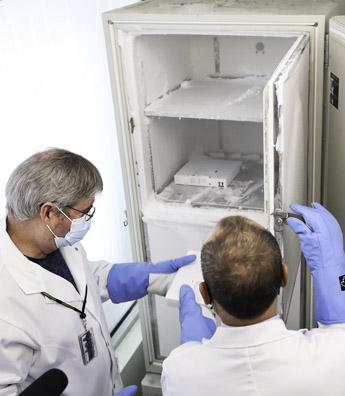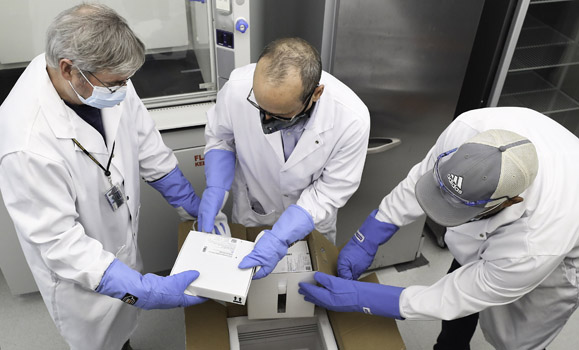When the first doses of the COVID-19 vaccine arrived in Nova Scotia on December 15, 2020, it was a milestone day for the province that offered the first optimistic glimpse of life after COVID-19.
The vaccine rollout is expected to take several months. The method involves a phased approach that first prioritizes delivering vaccines to health-care workers who are directly involved in the front-line COVID response.
However, before anyone rolled up their sleeves, the province needed to solve a seemingly simple question: Where would the vaccine be stored?
The Pfizer-BioNTech COVID-19, one of the two vaccines being used in Nova Scotia, must be stored in an ultra-cold freezer at temperatures between -80┬░C and -60┬░C. For perspective, the coldest temperature ever recorded in Canada was -63 ┬░C in Snag, Yukon back in 1947. With provinces across the country scrambling to procure freezers that could meet these requirements, the government of Nova Scotia turned to the Life Sciences Research Institute (LSRI) at ║┌┴╧│╘╣╧═Ї to be one of Nova ScotiaтАЩs ten cold storage sites.
A quick turnaround
, associate dean of research for the , remembers checking his email on December 1, 2020, to learn that planning was underway to receive the first test shipment in only one week.
While in fact several labs in the medical schoolтАЩs Tupper Building and LSRI are  equipped with an ultra-cold freezer, many of them were already being used for critical and time-sensitive research projects. Despite this, Dr. McLeod points to the research communityтАЩs selflessness as he worked through the process of finding a freezer.
equipped with an ultra-cold freezer, many of them were already being used for critical and time-sensitive research projects. Despite this, Dr. McLeod points to the research communityтАЩs selflessness as he worked through the process of finding a freezer.
тАЬAll of the researchers involved have been very helpful and understood how important this was,тАЭ says Dr. McLeod. тАЬCredit to the researchers for being so accommodating. A lot of them even offered the freezers in their own labs.тАЭ
After a long day of gathering information and taking stock of what was available, it was determined that a vacant lab in the LSRI had a freezer that met the exact requirements and could store over 100,000 doses of the vaccine. Not only did the freezer satisfy the storage demands, but it was also attached to backup generators and located close to two hospitals, making it the ideal location for a vaccination clinic.
A plan for everything
After securing the site, Dr. McLeod tapped Building Services Manager, Paul Bourgeois, to oversee the logistics of effective storage and continuous temperature monitoring of the vaccine.
тАЬThings were moving in a hurry,тАЭ Bourgeois recalled.
Before the vaccine could be shipped, both he and Dr. McLeod were required to complete webinars provided by the (PHAC) and Pfizer on how to properly handle and receive the vaccine.
тАЬItтАЩs pretty amazing how quickly PHAC rolled out the teaching materials at every level,тАЭ says Dr. McLeod. тАЬItтАЩs been very comprehensive to make sure people are well informed and educated about the vaccine.тАЭ
The vaccine is shipped around the world in a specially designed, temperature-controlled thermal container that uses dry ice to maintain the recommended storage temperature conditions.

тАЬThere is a device inside every container that monitors the temperature 24 hours a day,тАЭ says Bourgeois. тАЬWhen we open the container and stop the temperature recorder, we get an indicator that the shipment has maintained the proper ultra тАУlow temperature throughout its journey from Belgium to us here in Halifax.тАЭ
Once the vaccine is unpacked and safely stored in the ultra-cold freezer, there is also a procedure to send the expensive shipping container back to Pfizer to be reused for a future shipment.
тАЬWe take the dry ice out and a lot of times we give it to different researchers who can use it their labs,тАЭ says Bourgeois. тАЬThatтАЩs been one of the added benefits.тАЭ
Experience of a lifetime
With news of Nova Scotia receiving its largest shipments of the COVID-19 vaccine to date, and larger shipments expected, the handling and storage of the vaccine has become a well-oiled machine, one that was recognized by the Honourable Leo Glavine, then-minister of health and wellness, in a letter to Deep Saini, Dalhousie's president.
In the letter, Glavine specifically highlighted the exceptional work of Dr. David Anderson, dean of the Faculty of Medicine, Dr. McLeod, and Mr. Bourgeois, for their willingness to allow the LSRI to be used to store the vaccine, noting that тАЬThis single act brought hope to Nova Scotians that COVID-19 would come to an end.тАЭ
For Bourgeois, playing a role in ending a global pandemic was the furthest thing from his mind when he got word back in December that ║┌┴╧│╘╣╧═Їwould be storing the vaccine.
тАЬIтАЩm really glad I had the opportunity to go through this. There have been some challenges, but itтАЩs been rewarding and IтАЩm just really happy to be involved,тАЭ says Bourgeois. тАЬItтАЩs pretty cool.тАЭ

